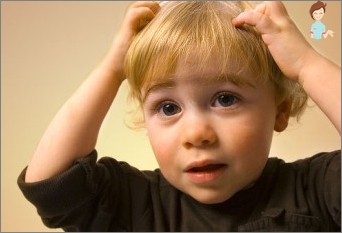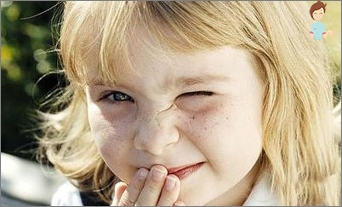Nervous tick in a child – what to do?
What is a nervous tick in a child? Symptoms of children’s nervous tick and its treatment. Causes of nervous tick. What parents should do to help the child with a nervous tick
Nervous tick in a child, like in an adult, has similar symptoms, although it has different reasons, and, consequently, treatment.
 Wikipedia determines nervous tick, as fast movements, which are carried out by an erroneous brain team. In children, it is manifested in the form of involuntary muscle twitching face and eyes, blinking, shuddering with all body. But the final diagnosis may be delivered only to a neurologist.
Wikipedia determines nervous tick, as fast movements, which are carried out by an erroneous brain team. In children, it is manifested in the form of involuntary muscle twitching face and eyes, blinking, shuddering with all body. But the final diagnosis may be delivered only to a neurologist.
The main age in which this disease can manifest itself especially brightly falls from two to ten years. Particularly crisis are periods of 3 years and 7-11 years. Nerval Tick is observed in each fifth child in these age framework and more often in boys than girls.
Most of all, children with a thin spiritual organization, prone to hysteria, are most susceptible to. The appearance of teak brings with it a decrease in the concentration of attention and memory, nonsense, nervous disorders, poor mood, depression and t.NS.
Fortunately, in ninety percent cases, if the problem occurs between 6 and 8 years, he passes as they grow. If Tick appeared at a biennium, then probably his appearance is a symptom of a more serious disease.
Sometimes it turns out to be controlled by tick, as well as depending on the time of day and mood, it can also go through.
Symptoms of baby nervous tick
 Motor – expressed in involuntary twitching with all body or its parts, face muscles, uncontrolled blinking;
Motor – expressed in involuntary twitching with all body or its parts, face muscles, uncontrolled blinking;- Vocal – expressed in cadium, chkanya, repetition of their last word or gesture what is called “Touretta syndrome”.
Causes of nervous tick in children
- Factor heredity. Typically, toddles are prone to nervous ticks, whose parents and themselves suffered in childhood by this ailment. It happens that the problem is manifested stronger than the parents, and is found at an earlier age.
- Restless decor. If a child does not feel protected in a family or a team – in kindergarten or school, then it is quite possible, his condition will turn into the development of teak. Also, if parents are overly pressing, there are overpriced requirements for its estimates and achievements in sports or school, the body can also respond to the nervous tick of the face or eye.
- Disease or fright. If there is a bad heredity in terms of teak, and the family has developed a nervous voltage situation, then some kind of stressful situation can provoke the disease.
- Medical reasons. Some brain diseases appear symptoms in the form of winking and twitching. Provokes the problem and shortage of such a trace element like magnesium.
Treatment of nervous ticks in a child
Treatment of this disease occurs comprehensively under the supervision of a neurologist.
And parents in order to help the baby to gain a mental equilibrium should adhere to some recommendations:
- Listen to the opinion of the son or daughter, more often ask what he thinks about, interest him;
- Oddly enough, but children love the dimension and predictability, it is very important to draw up and adhere to a certain routine of the day: at one time fall asleep, eat, walk – it calms down;
- Spend a mini-investigation. What, in your opinion, causes nervous tick on the face of a child? And try to avoid everything that can provoke it;
- It often happens that it is atmosphere that it provokes the development of teak, so if in the family is unfavorable, it is worth going to a family psychotherapist;
- Children of secondary and older school age will help visit group sessions of psychological therapy;
- Increase tactile contact with the child: more hug it and kiss it, more often talk about your love and how you need it;
 spend more time together, do what you like both, let it be walking or drawing or cycling, it does not matter, the main thing is to receive sincere emotions from this;
spend more time together, do what you like both, let it be walking or drawing or cycling, it does not matter, the main thing is to receive sincere emotions from this;- Do not sharpen the child’s attention to his difficulty;
- It is worth using relaxing techniques, such as massage, aromatherapy, soothing teas, baths with aromatic additives, physiotherapeutic procedures.
However, there are cases, and it also needs to be morally ready that conventional methods do not help, and will have to resort to medication treatment. Organize a qualified examination, refer to good doctors.
In such cases, it is not necessary to panic particularly, you need to believe in the best and remember that your nervous state can well play a bad joke and pass to the baby. Therefore, as Karlson said, calm, only calm, – you will succeed.


